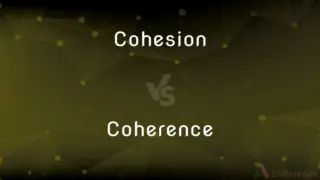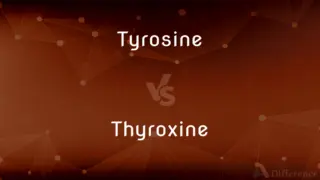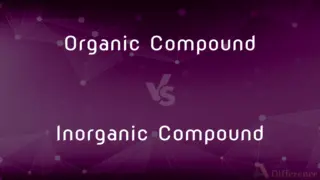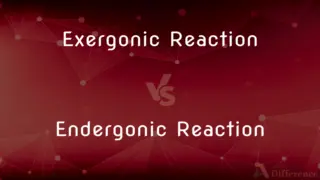Cockerel vs. Rooster — What's the Difference?
By Maham Liaqat & Fiza Rafique — Updated on March 11, 2024
A cockerel is a young male chicken, while a rooster is a male chicken.

Difference Between Cockerel and Rooster
Table of Contents
ADVERTISEMENT
Key Differences
Cockerels are young male chickens, typically under one year of age. They are known for their developing physical features, such as smaller combs and wattles, and they may not yet crow or exhibit dominant behaviors. On the other hand, roosters are fully mature male chickens, usually more than a year old, with prominent combs and wattles. They crow regularly, asserting their presence and territory.
While cockerels are still growing, they may exhibit less aggressive behavior compared to roosters, which can be quite territorial and dominant, especially in the presence of hens. Roosters, having reached at maturity level, play a key role in flock dynamics, including mating and protection.
In terms of appearance, cockerels' feathers and coloring may not be as vibrant or fully developed as those of a rooster. Roosters often have striking plumage, which they use to attract hens and deter rivals.
Regarding responsibility within a flock, cockerels are at the lower end of the pecking order and are figuring out their place, while roosters often assume the role of leader, protecting the flock from predators and resolving conflicts.
Farmers may differentiate these terms to manage breeding programs or to sell birds at different stages of development. Understanding the distinction between a cockerel and a rooster helps in providing appropriate care and setting expectations regarding behavior and flock dynamics.
ADVERTISEMENT
Comparison Chart
Age
Under 1 year old
More than 1 year old
Physical Features
Smaller combs and wattles, less vibrant plumage
Prominent combs and wattles, vibrant plumage
Behavior
Less aggressive, may not crow
More aggressive, crows regularly
Role in Flock
Lower in pecking order, learning role
Leader, protects flock, resolves conflicts
Significance in Farming
Often sold or raised for breeding or meat
Used for breeding, protection, and sometimes meat
Compare with Definitions
Cockerel
Less aggressive and quieter than male roosters.
Unlike the older roosters, the cockerel was timid around the hens.
Rooster
A male chicken, known for its crowing and dominance.
Every morning, the rooster's crow would announce the dawn to the farm.
Cockerel
A young male chicken, not yet fully mature.
The farmyard was lively, with a cockerel chasing the hens in the early morning.
Rooster
Distinctive large comb and wattles, vibrant plumage.
The rooster flaunted its radiant feathers as it strutted around the yard.
Cockerel
Still determining its place within the flock's social structure.
The cockerel kept to the outskirts, watching the rooster command the flock.
Rooster
Aggressive, territorial, and protective of the flock.
The rooster vigilantly guarded the hens from any intruders.
Cockerel
Before reaching maturity level and full big plumage.
The cockerel's feathers were beginning to show the bright colors of a rooster.
Rooster
Primarily used for breeding and sometimes for meat.
Our rooster plays a crucial role in ensuring the flock's growth and safety.
Cockerel
Often raised for meat or to mature into breeding roosters.
We're raising this cockerel to eventually replace our aging rooster.
Rooster
Leader, responsible for mating and defense.
The rooster quickly intervened when a dispute arose among the hens.
Cockerel
A young domestic cock.
Rooster
A person regarded as cocky or pugnacious.
Cockerel
A young rooster.
Rooster
A male domestic chicken (Gallus gallus domesticus) or other gallinaceous bird.
Cockerel
A young male chicken.
Rooster
A bird or bat which roosts or is roosting.
Cockerel
A young cock.
Rooster
An informer.
Cockerel
A young domestic cock; not older than one year
Rooster
A violent or disorderly person.
Rooster
(figuratively) A powerful, prideful, or pompous person.
Rooster
A man.
Rooster
A wild violet, when used in a children's game based on cockfighting.
Rooster
Legislation solely devised to benefit the legislators proposing it.
Rooster
The male of the domestic fowl; a cock.
Nor, when they [the Skinners and Cow Boys] wrung the neck of a rooster, did they trouble their heads whether he crowed for Congress or King George.
Common Curiosities
What is a rooster?
A fully mature male chicken, known for crowing and territorial behavior.
Can both cockerels and roosters crow?
Yes, but cockerels may crow less frequently or robustly than roosters.
Do cockerels have smaller combs and wattles than roosters?
Yes, their physical features are less developed compared to roosters.
What is a cockerel?
A young male chicken under one year old.
What roles do roosters play in a flock?
They lead, protect, and ensure the continuation of the flock through mating.
At what age does a cockerel become a rooster?
Typically around one year old, when it reaches maturity.
Why might a farmer differentiate between a cockerel and a rooster?
For breeding, selling, or management purposes based on age and development.
Can cockerels mate with hens?
They may start showing interest in mating as they approach maturity.
Are cockerels less aggressive than roosters?
Generally, yes, due to their younger age and lower social status in the flock.
Is it common to have multiple roosters in a flock?
It can lead to conflicts unless the flock is large enough to support multiple territories.
Do all roosters crow at dawn?
Crowing at dawn is common, but roosters can crow at any time of day.
How do farmers manage aggression in roosters?
By providing enough space, separating aggressive individuals, or selecting for temperament.
How can you tell a cockerel from a rooster?
By comparing age, size, plumage coloration, and the development of combs and wattles.
Can a cockerel's behavior predict its future temperament as a rooster?
Partially, though changes can occur as it matures and settles into its role in the flock.
What is the purpose of a rooster's crow?
To assert territory, signal to hens, and communicate with other roosters.
Share Your Discovery

Previous Comparison
Storage vs. Deposit
Next Comparison
Beach vs. StrandAuthor Spotlight
Written by
Maham LiaqatCo-written by
Fiza RafiqueFiza Rafique is a skilled content writer at AskDifference.com, where she meticulously refines and enhances written pieces. Drawing from her vast editorial expertise, Fiza ensures clarity, accuracy, and precision in every article. Passionate about language, she continually seeks to elevate the quality of content for readers worldwide.
















































